 CCCR a participat, miercuri, la conferința „Idei care schimbă România”, eveniment organizat de Comisia pentru afaceri europene a Camerei Deputaților în parteneriat cu Ministerul Investițiilor și Proiectelor Europene, Ministerul Cercetării, Inovării și Digitalizării, Ministerul Economiei, Antreprenoriatului și Turismului, Consiliul Național al Întreprinderilor Private Mici și Mijlocii din România și Directoratul Național de Securitate Cibernetică.
CCCR a participat, miercuri, la conferința „Idei care schimbă România”, eveniment organizat de Comisia pentru afaceri europene a Camerei Deputaților în parteneriat cu Ministerul Investițiilor și Proiectelor Europene, Ministerul Cercetării, Inovării și Digitalizării, Ministerul Economiei, Antreprenoriatului și Turismului, Consiliul Național al Întreprinderilor Private Mici și Mijlocii din România și Directoratul Național de Securitate Cibernetică.
 În debutul lucrărilor, gazda evenimentului, preşedintele Comisiei pentru afaceri europene, deputatul Ştefan Muşoiu, a subliniat că “România aspiră să devină un lider regional în securitate cibernetică, demers pentru a cărui reuşită este crucial să fie întreprinse acţiunile practice prin care să se stabilească un cadru eficient de colaborare între stat, sectorul privat, societatea civilă şi instituţiile educaţionale”.
În debutul lucrărilor, gazda evenimentului, preşedintele Comisiei pentru afaceri europene, deputatul Ştefan Muşoiu, a subliniat că “România aspiră să devină un lider regional în securitate cibernetică, demers pentru a cărui reuşită este crucial să fie întreprinse acţiunile practice prin care să se stabilească un cadru eficient de colaborare între stat, sectorul privat, societatea civilă şi instituţiile educaţionale”.
 Printre subiectele discutate s-au numărat provocările legislative, educaţionale, de conştientizare şi cercetare, precum şi colaborarea între diferitele sectoare pentru identificarea direcţiilor de acţiune.
Printre subiectele discutate s-au numărat provocările legislative, educaţionale, de conştientizare şi cercetare, precum şi colaborarea între diferitele sectoare pentru identificarea direcţiilor de acţiune.
 La eveniment au participat şi au susţinut intervenţii, din partea autorităţilor publice: domnul Andrei Alexandru, secretar de stat în Ministerul Cercetării, Inovării şi Digitalizării, domnul Gabriel Dinu, director adjunct în cadrul Directoratului Naţional de Securitate Cibernetică (DNSC) şi domnul Adrian Victor Vevera, director general al Institutului Naţional de Cercetare-Dezvoltare în Informatică – ICI Bucureşti.
La eveniment au participat şi au susţinut intervenţii, din partea autorităţilor publice: domnul Andrei Alexandru, secretar de stat în Ministerul Cercetării, Inovării şi Digitalizării, domnul Gabriel Dinu, director adjunct în cadrul Directoratului Naţional de Securitate Cibernetică (DNSC) şi domnul Adrian Victor Vevera, director general al Institutului Naţional de Cercetare-Dezvoltare în Informatică – ICI Bucureşti.
 Totodată, au vorbit despre modalităţi de consolidare a suveranităţii tehnologice şi perspectivele de investiţii în proiecte strategice de securitate cibernetică, reprezentanţi ai instituţiilor europene cu activitate în domeniu: domnul Luca Tagliaretti, directorul executiv al Centrului European de Competenţe în Materie de Securitate Cibernetică (ECCC) şi domnul Juhan Lepassaar, directorul executiv al Agenţiei Uniunii Europene pentru Securitate Cibernetică (ENISA).
Totodată, au vorbit despre modalităţi de consolidare a suveranităţii tehnologice şi perspectivele de investiţii în proiecte strategice de securitate cibernetică, reprezentanţi ai instituţiilor europene cu activitate în domeniu: domnul Luca Tagliaretti, directorul executiv al Centrului European de Competenţe în Materie de Securitate Cibernetică (ECCC) şi domnul Juhan Lepassaar, directorul executiv al Agenţiei Uniunii Europene pentru Securitate Cibernetică (ENISA).
 Domnul Aviram Atzaba, directorul executiv al Diviziei de Cooperare şi Relaţii Externe a Directoratului Naţional pentru Securitate Cibernetică din Israel a împărtăşit participanţilor din experienţa şi activitatea Sistemului de Coordonare şi Integrare a Actorilor din Sfera Publică – Privată – Academică din Israel.
Domnul Aviram Atzaba, directorul executiv al Diviziei de Cooperare şi Relaţii Externe a Directoratului Naţional pentru Securitate Cibernetică din Israel a împărtăşit participanţilor din experienţa şi activitatea Sistemului de Coordonare şi Integrare a Actorilor din Sfera Publică – Privată – Academică din Israel.
 Au contribuit la discuţii cu perspectivele proprii din sectorul privat: domnul Mădălin Dumitru, CEO şi fondator al Cyber Smart Defence (Stefanini Group), doamna Irina Peptenaru, fondator şi CEO al Cyber Smart Academy, şi doamna Silvia Uscov, avocat şi lector la Cyber Smart Academy.
Au contribuit la discuţii cu perspectivele proprii din sectorul privat: domnul Mădălin Dumitru, CEO şi fondator al Cyber Smart Defence (Stefanini Group), doamna Irina Peptenaru, fondator şi CEO al Cyber Smart Academy, şi doamna Silvia Uscov, avocat şi lector la Cyber Smart Academy.
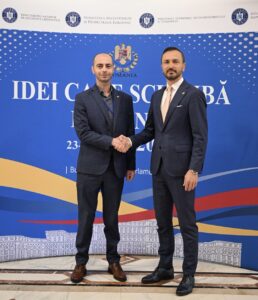
 CCCR has joined today at Trellix Latest Ransomware Detection and Response Workshop organized with ProVision in Bucharest.
CCCR has joined today at Trellix Latest Ransomware Detection and Response Workshop organized with ProVision in Bucharest.
 The main topics was:
The main topics was:
- Know how prepared your organization is and map a plan with a personalized workbook
- Take part in a hands-on simulated ransomware tabletop exercise highlighting scenarios for different roles
- See the AI-powered Trellix XDR platform in action
- Product demos and use cases for Endpoint Security, Collaboration Security and Network Security
- Deep dive into a ransomware reference architecture
- Network, connect, and share best practices with your industry peers
 Panels:
Panels:
- Anatomy of a Ransomware Attack & Self Assessment – Threat Landscape
- Facilitated Discussion & Tabletop Exercise – highlighting scenarios for roles like CISO, security analyst
- Trellix platform to defeat Ransomware
- Product demos and use cases for Endpoint Security, Collaboration Security and Network Security
- Security Operations War Room
 Speakers:
Speakers:
- Matteo Spiga – Solution Engineer
- Marco Kappert – Solutions Engineering Manager
- Arpad Toth – Enterprise Account Manager
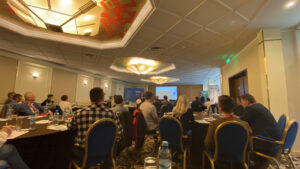
 CCCR attended today at OutLook on Resilience International Conference organized by Euro-Atlantic Resilience Center. The main panels was:
CCCR attended today at OutLook on Resilience International Conference organized by Euro-Atlantic Resilience Center. The main panels was:
– Tomorrow’s defence, by AI
– Unveiling the Future: AI in Cybersecurity
– Digital communications in the age of AI
– Mastering the AI: ethic and legal considerations
– AI as enabler and challenger of societal resilience
– AI-enhanced education
– Round-table: AI in money laundering and crypto
 The aim of the Conference is to address the complex impact of AI on the resilience of our society as a whole and explore the dual role that it has, of facilitator and disruptor, in domains like defense, communications, education, societal resilience, ethics and cyber. Objectives: In this regard, the conference aims to:
The aim of the Conference is to address the complex impact of AI on the resilience of our society as a whole and explore the dual role that it has, of facilitator and disruptor, in domains like defense, communications, education, societal resilience, ethics and cyber. Objectives: In this regard, the conference aims to:
– Facilitate awareness about current trends in this domain and the actors involved in the process
– Stimulate the exchange of information on AI in specific domains, covered by the panels of the conference
– Create a collaborative environment/format between experts, developers and decision-makers in the field
– Share best practices and discuss principles in the ethical and safe use of AI
– Strengthen trust and relationships between stakeholders
– Identify the major vulnerabilities and opportunities in the context of AI development and potential large-scale use towards building resilient institutions and societies
 Distinguished guests and speakers list:
Distinguished guests and speakers list:
* Ovidiu RAEȚCHI – President, Euro-Atlantic Resilience Centre
* Amb. Ovidiu DRANGA – Euro-Atlantic Resilience Centre
* Luca TAGLIARETTI – Executive Director, European Cybersecurity Competence Center
* Sorin–Dan MOLDOVAN – Chairperson, Committee for Information technologies and communications, Chamber of Deputies
* Gabriela RAMOS – Assistant Director-General for Social and Human Sciences of UNESCO (video)
* Cristian SFICHI – Regional Managing Director for Romania , Ukraine & Caucasus, THALES
* Luciana MOROGAN – AI expert at European Defence Fund, DG DEFIS, EU Commission
* Isidoros MONOGIOUDIS – Project officer, European Defence Agency
* Dongyoun CHO, Senior Researcher, United Nations Institute for Disarmament Research (UNIDIR)
* Andrei MITRANA – Senior Cyber Security Manager, Human Capital at National Cyber Security Directorate
* Cătălina IOSUB – System engineer specialist, Palo Alto Networks
* Marianne LINDROTH – Project Manager, Aalto University
* Yugo NEUMORNI – President, CIO Council
* Nathalie VANDYSTADT, Policy Coordinator for relations and negotiations with the European Parliament and the Council of the EU, DG CONNECT, European Commission
* Seizo ONOE – Director, ITU Telecommunication Standardization Bureau
* Ioan DEMETER – Partner, Mware Solutions SA
* Major-General Mădălin MIHAI – Technical Deputy Director, Special Telecommunications Service
* Ciprian ZAMFIRESCU – Vodafone Romania
* Sabin DIMA – Founder & CEO, Humans.AI
- Besleaga Liviu – President RO-EU CCCR
 CCCR a luat parte prin intermediul dl Presedinte Besleaga Liviu la Digital Innovation Summit Bucharest si CRITICAL INFRASTRUCTURE PROTECTION FORUM.
CCCR a luat parte prin intermediul dl Presedinte Besleaga Liviu la Digital Innovation Summit Bucharest si CRITICAL INFRASTRUCTURE PROTECTION FORUM.
 Institutul Național de Cercetare-Dezvoltare în Informatică – ICI București a dat startul Digital Innovation Summit Bucharest (DISB), un eveniment de referință în domeniul inovației digitale, diplomației cibernetice și protecției infrastructurilor critice. Organizat sub Înaltul Patronaj al Președintelui Camerei Deputaților și al Premierului României, DISB 2024 aduce împreună lideri și experți din întreaga lume pentru a discuta și modela viitorul digital al societății.
Institutul Național de Cercetare-Dezvoltare în Informatică – ICI București a dat startul Digital Innovation Summit Bucharest (DISB), un eveniment de referință în domeniul inovației digitale, diplomației cibernetice și protecției infrastructurilor critice. Organizat sub Înaltul Patronaj al Președintelui Camerei Deputaților și al Premierului României, DISB 2024 aduce împreună lideri și experți din întreaga lume pentru a discuta și modela viitorul digital al societății.
 Evenimentul a debutat cu o sesiune de discursuri susținute de domnul Nicolae Ionel Ciucă, Președintele Senatului României, domnul Mihai Alexandru Ghigiu, Șeful Cancelariei Prim-Ministrului României, domnul Bogdan-Marius Chiriţoiu, Președintele Consiliului Concurenței, domnul Ștefan Muşoiu, Președintele Comisiei pentru Afaceri Europene, doamna Aawatif Hayar, Ministrul Solidarității, Incluziunii Sociale și Familiei din Regatul Maroc, domnul Dragoş Cristian Vlad, Președintele Autorității pentru Digitalizarea României, doamna Ioana Roxana Melenciuc-Ioan, Președintele Institutului Național pentru Administrație, Excelența Sa Kathleen Ann Kavalec, Ambasadorul SUA în România, domnul Ilgar Ali Oghlu Musayev, Șeful Serviciului de Comunicații Speciale și Securitatea Informațiilor, Republica Azerbaidjan, a căror gazdă a fost domnul Adrian Victor Vevera, Directorul General al ICI București.
Evenimentul a debutat cu o sesiune de discursuri susținute de domnul Nicolae Ionel Ciucă, Președintele Senatului României, domnul Mihai Alexandru Ghigiu, Șeful Cancelariei Prim-Ministrului României, domnul Bogdan-Marius Chiriţoiu, Președintele Consiliului Concurenței, domnul Ștefan Muşoiu, Președintele Comisiei pentru Afaceri Europene, doamna Aawatif Hayar, Ministrul Solidarității, Incluziunii Sociale și Familiei din Regatul Maroc, domnul Dragoş Cristian Vlad, Președintele Autorității pentru Digitalizarea României, doamna Ioana Roxana Melenciuc-Ioan, Președintele Institutului Național pentru Administrație, Excelența Sa Kathleen Ann Kavalec, Ambasadorul SUA în România, domnul Ilgar Ali Oghlu Musayev, Șeful Serviciului de Comunicații Speciale și Securitatea Informațiilor, Republica Azerbaidjan, a căror gazdă a fost domnul Adrian Victor Vevera, Directorul General al ICI București.
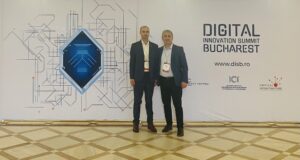
 In cadrul evenimentului a participat si dl Marian Florea, Presedintele Romanian City Managers Association care reprezinta peste 700 de UAT-uri la nivel national.
In cadrul evenimentului a participat si dl Marian Florea, Presedintele Romanian City Managers Association care reprezinta peste 700 de UAT-uri la nivel national.
 Discuțiile din prima zi au acoperit o gamă variată de subiecte pe tema diplomației cibernetice, de la politici digitale globale până la strategii de securitate cibernetică și impactul tehnologiei asupra relațiilor internaționale. Participanții au avut oportunitatea de a se familiariza cu cele mai recente tendințe din domeniul inovației digitale și de a stabili conexiuni valoroase în cadrul întâlnirilor B2B și a dialogurilor interministeriale internaționale.
Discuțiile din prima zi au acoperit o gamă variată de subiecte pe tema diplomației cibernetice, de la politici digitale globale până la strategii de securitate cibernetică și impactul tehnologiei asupra relațiilor internaționale. Participanții au avut oportunitatea de a se familiariza cu cele mai recente tendințe din domeniul inovației digitale și de a stabili conexiuni valoroase în cadrul întâlnirilor B2B și a dialogurilor interministeriale internaționale.
 DISB este o platformă globală de dialog și schimb de idei, cuprinzând două evenimente majore: Forumul de Protejare a Infrastructurii Critice (CIP Forum) și Conferința Internațională privind Diplomația Cibernetică (ICCD). CIP Forum se concentrează pe utilizarea blockchainului în combaterea amenințărilor cibernetice, inaugurând în același timp Muzeul NFT al ICI București și adresând teme importante precum implicarea femeilor în inovație și societate. Pe de altă parte, ICCD analizează intersecția dintre tehnologie și relațiile internaționale, cu un accent pe consensul global în politica digitală, consolidarea alianțelor regionale de securitate cibernetică și strategii proactive împotriva dezinformării.
DISB este o platformă globală de dialog și schimb de idei, cuprinzând două evenimente majore: Forumul de Protejare a Infrastructurii Critice (CIP Forum) și Conferința Internațională privind Diplomația Cibernetică (ICCD). CIP Forum se concentrează pe utilizarea blockchainului în combaterea amenințărilor cibernetice, inaugurând în același timp Muzeul NFT al ICI București și adresând teme importante precum implicarea femeilor în inovație și societate. Pe de altă parte, ICCD analizează intersecția dintre tehnologie și relațiile internaționale, cu un accent pe consensul global în politica digitală, consolidarea alianțelor regionale de securitate cibernetică și strategii proactive împotriva dezinformării.
 Evenimentul beneficiază de sprijinul unor companii de renume precum Vodafone, MultiversX, Kontron Services, Danubius, ProVision, OPSWAT, Simavi, FIP Consulting, CISCO, Tema Energy, MediGo, Motorola Solution Romania, Claroty, MSAB, Raiffeisen, Stimpex, Domeniile Averesti, Konica Minolta, Automobile Bavaria Group, TAROM, Mobexpert și Aqua Carpatica.
Evenimentul beneficiază de sprijinul unor companii de renume precum Vodafone, MultiversX, Kontron Services, Danubius, ProVision, OPSWAT, Simavi, FIP Consulting, CISCO, Tema Energy, MediGo, Motorola Solution Romania, Claroty, MSAB, Raiffeisen, Stimpex, Domeniile Averesti, Konica Minolta, Automobile Bavaria Group, TAROM, Mobexpert și Aqua Carpatica.
]]>
 CCCR was invited to the IMS SUMMIT in Moldova, an international event where the current context on the Moldova – Ukraine – Romania axis was debated. The invited mayors had the opportunity to present their projects and achievements. To to the SUMMIT has attended by Mr. Marian Florea, president of the Association of Public Administrators from Romania who presented the opportunities for cross-border development and interconnection between mayors and city managers. Besleaga Liviu, the president of the CCCR for the RO-EU area, publicly expressed his support for the summit as well as for the business opportunities that can develop between the mayors and states.
CCCR was invited to the IMS SUMMIT in Moldova, an international event where the current context on the Moldova – Ukraine – Romania axis was debated. The invited mayors had the opportunity to present their projects and achievements. To to the SUMMIT has attended by Mr. Marian Florea, president of the Association of Public Administrators from Romania who presented the opportunities for cross-border development and interconnection between mayors and city managers. Besleaga Liviu, the president of the CCCR for the RO-EU area, publicly expressed his support for the summit as well as for the business opportunities that can develop between the mayors and states.
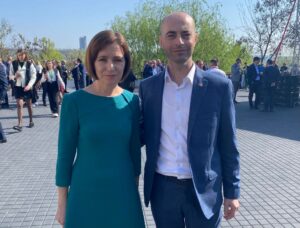
 International Mayors Summit (IMS), launched in 2016 in Ukraine as a knowledge exchange platform for local government leaders, became “more than a conference”, a place where projects and partnerships are born.
International Mayors Summit (IMS), launched in 2016 in Ukraine as a knowledge exchange platform for local government leaders, became “more than a conference”, a place where projects and partnerships are born.
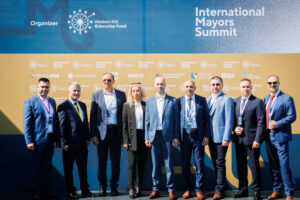
 In navigating this challenging journey, Ukraine and Moldova have drawn closer to the European family they belong to, recognizing that local-level cooperation is integral to strengthening regional security and development efforts. Consequently, the 5th International Mayors Summit will take place in Moldova with the esteemed support of President Maia Sandu.
In navigating this challenging journey, Ukraine and Moldova have drawn closer to the European family they belong to, recognizing that local-level cooperation is integral to strengthening regional security and development efforts. Consequently, the 5th International Mayors Summit will take place in Moldova with the esteemed support of President Maia Sandu.

 The annual Summit brings together prominent mayors from throughout the world, the business community, international organizations representatives and civil society to discuss solutions, innovations, best practices and cities’ success stories in various spheres. The Summit is organized by Western NIS Enterprise Fund. In Ukraine it was supported by the Prime Minister of Ukraine. Mayors and experts from the USA, Canada, the Netherlands, UK, UAE, Albania, Lithuania, Sweden, Poland, and Germany took part at the International Mayors Summit.
The annual Summit brings together prominent mayors from throughout the world, the business community, international organizations representatives and civil society to discuss solutions, innovations, best practices and cities’ success stories in various spheres. The Summit is organized by Western NIS Enterprise Fund. In Ukraine it was supported by the Prime Minister of Ukraine. Mayors and experts from the USA, Canada, the Netherlands, UK, UAE, Albania, Lithuania, Sweden, Poland, and Germany took part at the International Mayors Summit.

 The Summit’s format allows participants to get knowledge and build a strong international network with prominent global leaders of urban transformation, join professional speed-networking sessions, test various solutions right on the spot, sign memorandums and launch special projects.
The Summit’s format allows participants to get knowledge and build a strong international network with prominent global leaders of urban transformation, join professional speed-networking sessions, test various solutions right on the spot, sign memorandums and launch special projects.
 In this volatile world, influenced by pandemic, wars and global political and economic crises, mayors are at the frontline of urgent and necessary decisions, trying to coordinate with the central government, create partnerships with businesses, engage and convince the community.
In this volatile world, influenced by pandemic, wars and global political and economic crises, mayors are at the frontline of urgent and necessary decisions, trying to coordinate with the central government, create partnerships with businesses, engage and convince the community.
 Since February 24, 2022, Ukrainian city leaders have confronted a new and critical challenge in safeguarding their communities from the brutality of the Russian aggressor. Cities like Mariupol have been entirely devastated, while Kharkiv and Mykolaiv face incessant attacks, and Chernihiv, Irpin, and Bucha have endured devastating destruction. The enemy targets vital civilian infrastructure—hospitals, schools, kindergartens, roads, bridges, railway hubs, and stations. Security has emerged as a paramount challenge for Ukrainian cities nationwide. In the western regions, communities are diligently providing refuge for internally displaced persons (IDPs) and relocated businesses amid an uncertain period. Remarkably, international cooperation among communities has reached unprecedented levels, fostering unity around democratic, safe, and innovative development.
Since February 24, 2022, Ukrainian city leaders have confronted a new and critical challenge in safeguarding their communities from the brutality of the Russian aggressor. Cities like Mariupol have been entirely devastated, while Kharkiv and Mykolaiv face incessant attacks, and Chernihiv, Irpin, and Bucha have endured devastating destruction. The enemy targets vital civilian infrastructure—hospitals, schools, kindergartens, roads, bridges, railway hubs, and stations. Security has emerged as a paramount challenge for Ukrainian cities nationwide. In the western regions, communities are diligently providing refuge for internally displaced persons (IDPs) and relocated businesses amid an uncertain period. Remarkably, international cooperation among communities has reached unprecedented levels, fostering unity around democratic, safe, and innovative development.
 The overarching theme of the Summit is centered on the understanding that the reconstruction of cities is tantamount to the reconstruction of society. Accordingly, this Summit will focus on vital topics such as revitalizing cities, making them attractive to human capital, developing economic profiles, ensuring safety and growth, and introducing innovative solutions to fortify a human-centric approach to city development.
The overarching theme of the Summit is centered on the understanding that the reconstruction of cities is tantamount to the reconstruction of society. Accordingly, this Summit will focus on vital topics such as revitalizing cities, making them attractive to human capital, developing economic profiles, ensuring safety and growth, and introducing innovative solutions to fortify a human-centric approach to city development.
 CCCR has been present at Fourth Romanian Business & Investment Roundtable organized by Economist Impact SE Europe Events entitled “Shaping a new narrative for prosperity and growth”
CCCR has been present at Fourth Romanian Business & Investment Roundtable organized by Economist Impact SE Europe Events entitled “Shaping a new narrative for prosperity and growth”
 The current geopolitical implications for the region along with energy spikes and increasing food prices are driving the world to a multi-faceted crisis. Mankind is sailing through troubled and uncharted waters. Adding to the aforementioned challenges, there are also concerns on new refugee flows owing to the current conflicts and Europe’s security architecture.
The current geopolitical implications for the region along with energy spikes and increasing food prices are driving the world to a multi-faceted crisis. Mankind is sailing through troubled and uncharted waters. Adding to the aforementioned challenges, there are also concerns on new refugee flows owing to the current conflicts and Europe’s security architecture.
 Reinforcing Europe’s unity and solidarity in the midst of this turmoil is ongoing. Governments, institutions and civil society should cooperate more closely with key stakeholders in order to mitigate the current crisis, underpin social cohesion and achieve stability and recovery for Europe.
Reinforcing Europe’s unity and solidarity in the midst of this turmoil is ongoing. Governments, institutions and civil society should cooperate more closely with key stakeholders in order to mitigate the current crisis, underpin social cohesion and achieve stability and recovery for Europe.
 Against this setting, Romania has a strategic role to play as the country emerges as a key player for Europe’s collective security and NATO’s strategy with regards to Ukraine’s war with Russia. On the business front, Romania’s recent achievements in attracting strategic foreign investments and promoting innovation can serve as a role model and a positive narrative for other central and eastern European countries.
Against this setting, Romania has a strategic role to play as the country emerges as a key player for Europe’s collective security and NATO’s strategy with regards to Ukraine’s war with Russia. On the business front, Romania’s recent achievements in attracting strategic foreign investments and promoting innovation can serve as a role model and a positive narrative for other central and eastern European countries.
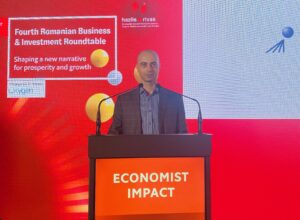
 Discussion topics:
Discussion topics:
 THE ECONOMIST’S FORECAST ON EUROPE’S GEOPOLITICAL LANDSCAPE AND EUROPE’S ECONOMIC LANDSCAPE
THE ECONOMIST’S FORECAST ON EUROPE’S GEOPOLITICAL LANDSCAPE AND EUROPE’S ECONOMIC LANDSCAPE
Joan Hoey, editorial director, The Democracy Index, Europe consultant, The Economist Group
 ADDRESSING GLOBAL THREATS AT EUROPE’S FRONTLINE: THE SIGNIFICANCE OF MULTILATERAL CO-OPERATION
ADDRESSING GLOBAL THREATS AT EUROPE’S FRONTLINE: THE SIGNIFICANCE OF MULTILATERAL CO-OPERATION
• A new era of power politics?
• What can we expect about the rules-based international order?
• Romania’s and Bulgaria’s accession to Schengen: next steps to be taken
• Strengthening cross-border cooperation and integration
– Guy Verhofstadt, MEP, former prime minister, Belgium
– Sergei Stanishev, MEP, vice-chair, Committee on Foreign Affairs, European Parliament, fmr prime minister of Bulgaria
– Traian Hristea, secretary of state for global affairs and diplomatic strategies, Ministry of Foreign Affairs, Romania
– Kathleen Kavalec, US ambassador to Romania
 EUROPE’S STRATEGY FOR UNITY, SOVEREIGNTY
EUROPE’S STRATEGY FOR UNITY, SOVEREIGNTY
AND COHESION: WHERE DOES ROMANIA STAND?
– Mihai Alexandru Ghigiu, head of the Chancellery of the Prime Minister of Romania
– Martin Schulz, former president, European Parliament, chair, Friedrich Ebert Foundation
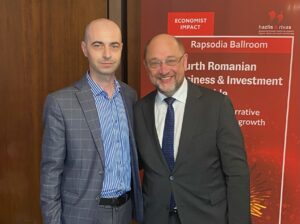
 FINANCIAL AND ECONOMIC PROSPECTS FOR EUROPE IN AN ENVIRONMENT OF HEIGHTENED UNCERTAINTY
FINANCIAL AND ECONOMIC PROSPECTS FOR EUROPE IN AN ENVIRONMENT OF HEIGHTENED UNCERTAINTY
• The financial outlook for SE Europe
• Necessary reforms for a more resilient growth model
• Unlocking potential in the new business landscape through restructuring
– Marcel-Ioan Boloș, minister of finance, Romania
– Mateusz Szczurek, lead economist for central and south-eastern EU countries, EBRD, former minister of finance, Poland
– Paul Dieter-Cîrlănaru, CEO, CITR
 OPPORTUNITIES FOR INVESTMENT & GROWTH IN ROMANIA AND THE WIDER REGION
OPPORTUNITIES FOR INVESTMENT & GROWTH IN ROMANIA AND THE WIDER REGION
• Sharing insight with the international institutions
• Financing strategic sectors through private equity instruments
• The investor’s point of view
– Johan Meyer, CEO, Franklin Templeton Romania
– Andrei Cionca, CEO and co-founder, Impetum Group
– Stefan Kraus, chief operating officer, member of the executive committee, Henley & Partners
 RE-INDUSTRIALISING EUROPE: STRATEGIES FOR SUSTAINABLE GROWTH AMID GLOBAL TRADE UNCERTAINTIES
RE-INDUSTRIALISING EUROPE: STRATEGIES FOR SUSTAINABLE GROWTH AMID GLOBAL TRADE UNCERTAINTIES
• Policy framework for industrial development
• Romania’s industrial sector: an evaluation
– Ștefan-Radu Oprea, minister of economy, Romania
– Alin Marius Andrieș, secretary of state, Ministry of Finance, Romania
– Nikos Papathanasiou, VP public policy & economic research, Philip Morris International
 WHY EUROPE NEEDS INNOVATION TO STAY COMPETITIVE
WHY EUROPE NEEDS INNOVATION TO STAY COMPETITIVE
• Where do Europe and especially SE Europe stand?
• Leveraging tech to close the productivity gap
– David Born, director, Roland Berger Institute
 TECHNOLOGY: WITNESSING A GREAT TRANSITION
TECHNOLOGY: WITNESSING A GREAT TRANSITION
• How are AI, innovation and digitalisation altering the business landscape?
• How does digitalisation affect regional and social inequalities?
• Investing in technology: Romania as a case study
• Tech disruption and geopolitical divisions
– Marius Viorel Posa, secretary of state, Ministry of Research, Innovation and Digitalization, Romania
– Achilleas Kanaris, CEO, Vodafone Romania
– Iwona Sikora, senior vice-president and general manager, EMEA, Iron Mountain
– Kostas Loukas, EMEA regional general manager, Government, Microsoft
 HOW CAN ROMANIA’S INFRASTRUCTURE ACCELERATE GROWTH IN TIMES OF GROWING CONFLICT?
HOW CAN ROMANIA’S INFRASTRUCTURE ACCELERATE GROWTH IN TIMES OF GROWING CONFLICT?
• Assessing the consequences of the war in Ukraine
• The significance of concession agreements and PPPs
• Europe’s comparative advantages in the context of global antagonisms
• EU’s eastern partners: How can the EU increase its presence in the region?
– Ionut Savoiu, state secretary of transport and infrastructure, Romania
– Nikolaos Tachiaos, deputy minister of infrastructure and transport, Greece (via connection)
– Vicky Loizou, secretary-general of private investments, Ministry of Development, Greece
– Alexandros Exarchou, chairman of the BoD & CEO, Aktor – Member of Intrakat Group
 CAN ENERGY SECURITY AND AFFORDABILITY GO HAND IN HAND?
CAN ENERGY SECURITY AND AFFORDABILITY GO HAND IN HAND?
• Green transition: challenges and complications
• Romania’s contribution to Europe’s energy security
• The role of hydrocarbons
• Which energy infrastructure projects are critical for the region?
– Matthew Baldwin, deputy director-general, DG Energy, European Commission (via connection)
– Boyana Achovski, secretary-general, Gas Infrastructure Europe
– Alessio Menegazzo, CEO & country manager, PPC Romania
– Christina Verchere, CEO OMV Petrom
– Ștefan Popescu, director of regulations and public affairs – Romgaz Black Sea
– Angelos Syrigos, associate professor, International Law & Foreign Policy, Panteion University, MP, Hellenic Parliament
 CLIMATE CHANGE: TIME FOR ACTION
CLIMATE CHANGE: TIME FOR ACTION
– Sir David King, chair, Climate Crisis Advisory Group, UK, fmr permanent special representative for climate change
 SECURING A CLEAN ENVIRONMENT FOR FUTURE GENERATIONS
SECURING A CLEAN ENVIRONMENT FOR FUTURE GENERATIONS
• Environmental policy and regulation for the green economy and sustainable development
• ESG for business leadership
– Mircea Fechet, minister of environment, waters and forests, Romania
– Catalina Marga, chief financial officer, RetuRO
– Alice Nichita, corporate affairs & sustainability director, Coca-Cola HBC Romania
 INVESTMENT OPPORTUNITIES FOR SE EUROPE IN TIMES OF GEOPOLITICAL TURMOIL
INVESTMENT OPPORTUNITIES FOR SE EUROPE IN TIMES OF GEOPOLITICAL TURMOIL
• Finding the opportunities
• Strategy for business ventures
• Enhancing connectivity and logistics
• The Mare to Mare project and its regional impact
– Pilar Solano, head of department, lending operations in central and south eastern Europe, EIB
– Victoria Zinchuk, director for Romania, EBRD
– Ramona Jurubiță, vice-president, FIC Romania
– Natalia Bejan, general director, Invest Moldova Agency
– George Kremlis, chair, Espoo convention, United Nations Economic Commission for Europe, ambassador, European Public Law Organization, Bulgaria

 CCCR was pleased to participate today at ProVision presentation of Oxygen Forensics services in Romania.
CCCR was pleased to participate today at ProVision presentation of Oxygen Forensics services in Romania.
 The related topics was:
The related topics was:
– Introduction and welcome to Oxygen Forensics Vendor Day.
– Introduction and talk about your experienced in field (Matt Finnegan)
– Key Updates to Detective in 2023.
1. Roadmap for 2024 & Beyond.
2. Oxygen Forensics Vision & Strategic Approac
– Oxygen Forensic® Detective:
1. Demystifying Unisoc & Mediatek extraction methods with Oxygen Forensic® Detective
2. KeyScout & KeyDiver – Introductions
– OAC & ORE – New Product Overview basic to see the Oxygen catalog
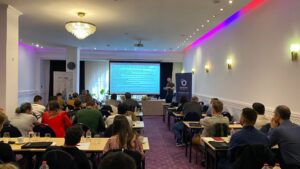
 The Octopus Conference is part of the Octopus Project which is currently funded by voluntary contributions
The Octopus Conference is part of the Octopus Project which is currently funded by voluntary contributionsfrom Canada, Hungary, Iceland, Italy, Japan, Netherlands, UK and USA.
 Held every 12 to 18 months by the Council of Europe, the Octopus Conference constitutes one of the biggest and finest platforms of exchange in cybercrime gathering experts from more than 100 countries, international organisations, private sector and academia.
Held every 12 to 18 months by the Council of Europe, the Octopus Conference constitutes one of the biggest and finest platforms of exchange in cybercrime gathering experts from more than 100 countries, international organisations, private sector and academia.
 The focus for the 2023 edition will be two-fold:
The focus for the 2023 edition will be two-fold:
– Securing and sharing electronic evidence: the tools are here – let’s use them!
– Capacity building on cybercrime and electronic evidence: 10 years of Cybercrime Programme Office (C-PROC) – What impact so far; what’s next?
 Besleaga Liviu, President of the RO-EU CCCR was present at the following workshops and projects:
Besleaga Liviu, President of the RO-EU CCCR was present at the following workshops and projects:
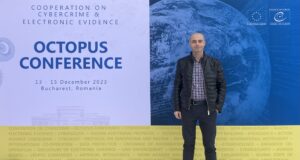
 Workshops
Workshops
 Workshop 1: Global state of cybercrime legislation. Legislation is the basis for criminal justice action on cybercrime and electronic evidence. Many governments around the world have undertaken legal reforms, often using the Convention on Cybercrime (Budapest Convention) as a guideline. However, cybercrime legislation also needs to meet human rights and rule of law requirements to prevent misuse. The aim of this workshop is to review progress made worldwide in terms of cybercrime legislation and to identify possible risks and challenges.
Workshop 1: Global state of cybercrime legislation. Legislation is the basis for criminal justice action on cybercrime and electronic evidence. Many governments around the world have undertaken legal reforms, often using the Convention on Cybercrime (Budapest Convention) as a guideline. However, cybercrime legislation also needs to meet human rights and rule of law requirements to prevent misuse. The aim of this workshop is to review progress made worldwide in terms of cybercrime legislation and to identify possible risks and challenges.
 Workshop 2: Spontaneous information sharing. Criminal justice authorities often possess valuable information that it believes may assist the authorities of another country in a criminal investigation but of which these other authorities are not aware of. Parties to the Convention on Cybercrime (Budapest Convention) may share this type of information through Article 26 on “spontaneous information”: “A Party may, within the limits of its domestic law and without prior request, forward to another Party information obtained within the framework of its own investigations when it considers that the disclosure of such information might assist the receiving Party in initiating or carrying out investigations or proceedings concerning criminal offences established in accordance with this Convention or might lead to a request for co-operation by that Party under this chapter….” The relevance of Article 26 has been increasing over time, including within the context of cases related to the dark web or to the sharing of data retrieved from encrypted communications. The aim of the workshop is to identify current practices of using Article 26 of the Convention on Cybercrime.
Workshop 2: Spontaneous information sharing. Criminal justice authorities often possess valuable information that it believes may assist the authorities of another country in a criminal investigation but of which these other authorities are not aware of. Parties to the Convention on Cybercrime (Budapest Convention) may share this type of information through Article 26 on “spontaneous information”: “A Party may, within the limits of its domestic law and without prior request, forward to another Party information obtained within the framework of its own investigations when it considers that the disclosure of such information might assist the receiving Party in initiating or carrying out investigations or proceedings concerning criminal offences established in accordance with this Convention or might lead to a request for co-operation by that Party under this chapter….” The relevance of Article 26 has been increasing over time, including within the context of cases related to the dark web or to the sharing of data retrieved from encrypted communications. The aim of the workshop is to identify current practices of using Article 26 of the Convention on Cybercrime.
 Workshop 3: Online child sexual exploitation and abuse. Over the past decade multi-national service providers deployed technology for the automated detection of child sexual abuse materials (CSAM) that was uploaded or disseminated via their services. Tens of millions of CSAM have been identified and reported in this way, and in many cases have helped rescue victims and identify and prosecute offenders worldwide. At the same time, the use of such techniques have raised rule of law and human rights concerns, for example, that they interfere with the privacy of communications or involve the transborder transfer of personal data or violate due process requirements. The aim of the workshop is to continue the search for solutions that permit governments to meet their positive obligation to protect children against online sexual violence and enable service providers to use automated technologies to identify and report CSAM with the necessary privacy, data protection and rule of law safeguards.
Workshop 3: Online child sexual exploitation and abuse. Over the past decade multi-national service providers deployed technology for the automated detection of child sexual abuse materials (CSAM) that was uploaded or disseminated via their services. Tens of millions of CSAM have been identified and reported in this way, and in many cases have helped rescue victims and identify and prosecute offenders worldwide. At the same time, the use of such techniques have raised rule of law and human rights concerns, for example, that they interfere with the privacy of communications or involve the transborder transfer of personal data or violate due process requirements. The aim of the workshop is to continue the search for solutions that permit governments to meet their positive obligation to protect children against online sexual violence and enable service providers to use automated technologies to identify and report CSAM with the necessary privacy, data protection and rule of law safeguards.
 Workshop 4: Synergies between Conventions for a safer cyberspace. The standards of the Conventions maintained by the Council of Europe in the areas of cybercrime, protection of children against sexual abuse, trafficking in human beings and violence against women are not simply complementary, but meant to encourage work between criminal justice authorities, protection officers and policy makers to ensure better criminal justice and related action in these areas. Substantive law offences, use of procedural tools for investigation and preventive/protective work with victims and witnesses are just examples where harmonisation would be key, while concepts such as action on cyberviolence could serve to indicate where and how such synergies should work. The aim of this workshop is to further enhance synergies between four different – but interconnected – Conventions:
Workshop 4: Synergies between Conventions for a safer cyberspace. The standards of the Conventions maintained by the Council of Europe in the areas of cybercrime, protection of children against sexual abuse, trafficking in human beings and violence against women are not simply complementary, but meant to encourage work between criminal justice authorities, protection officers and policy makers to ensure better criminal justice and related action in these areas. Substantive law offences, use of procedural tools for investigation and preventive/protective work with victims and witnesses are just examples where harmonisation would be key, while concepts such as action on cyberviolence could serve to indicate where and how such synergies should work. The aim of this workshop is to further enhance synergies between four different – but interconnected – Conventions:
– Convention on Cybercrime (ETS No. 185)
– Council of Europe Convention on the Protection of Children against Sexual Exploitation and Sexual Abuse (CETS No. 201)
– Council of Europe Convention on preventing and combating violence against women and domestic violence (CETS No. 210)
– Council of Europe Convention on Action against Trafficking in Human Beings (CETS No. 197)
 Workshop 5: The interplay of cybercrime and financial investigations. Establishing efficient collaboration between criminal justice authorities investigating cybercrime and institutions responsible for financial investigations is vital to safeguard societies from criminal activities. Both financial investigations and actions against cybercrime play a pivotal role in achieving this goal. The workshop will focus on identifying areas of collaboration, fostering domestic and international cooperation, disseminating effective models for interagency teamwork and highlighting the principles governing the exchange of information and evidence among financial and cybercrime experts.
Workshop 5: The interplay of cybercrime and financial investigations. Establishing efficient collaboration between criminal justice authorities investigating cybercrime and institutions responsible for financial investigations is vital to safeguard societies from criminal activities. Both financial investigations and actions against cybercrime play a pivotal role in achieving this goal. The workshop will focus on identifying areas of collaboration, fostering domestic and international cooperation, disseminating effective models for interagency teamwork and highlighting the principles governing the exchange of information and evidence among financial and cybercrime experts.
 Workshop 6: Cybercrime and AI. Artificial Intelligence in the criminal justice sector can both represent a serious threat or enhance the fight against cybercrime. Generative AI may provide effective ways to detect crime or provide investigative assistance by analysing vast amount of data but may also be misused for criminal purposes. Falsified data (such as deep fakes) can even be presented as evidence in court. The aim of this workshop is to examine (a) the criminal threats that generative AI may pose for the criminal justice sector, (b) its role in countering cybercrime, and (c) the key issues that need to be taken into account in assessing electronic evidence generated by AI.
Workshop 6: Cybercrime and AI. Artificial Intelligence in the criminal justice sector can both represent a serious threat or enhance the fight against cybercrime. Generative AI may provide effective ways to detect crime or provide investigative assistance by analysing vast amount of data but may also be misused for criminal purposes. Falsified data (such as deep fakes) can even be presented as evidence in court. The aim of this workshop is to examine (a) the criminal threats that generative AI may pose for the criminal justice sector, (b) its role in countering cybercrime, and (c) the key issues that need to be taken into account in assessing electronic evidence generated by AI.
 Workshop 7: Regional workshop for Asia. With the growing reliance on information-driven technology and the exponential growth in the amount of data created and exchanged every day by users and organizations, the right to the protection of personal data faces major challenges. This is also true for criminal justice authorities who need to reconcile effective measures to obtain, process and share personal data that are needed in criminal investigations and proceedings with data protection requirements. Where these requirements are met, they facilitate the sharing of personal data also across borders and with service providers and other private sector entities. This is why Article 14 on the protection of personal data was included in the Second Protocol to the Budapest Convention. The aim of this workshop is share experience – and discuss challenges – for countries of Asia on the setting up of data protection frameworks in order to permit a more effective criminal justice response to cybercrime.
Workshop 7: Regional workshop for Asia. With the growing reliance on information-driven technology and the exponential growth in the amount of data created and exchanged every day by users and organizations, the right to the protection of personal data faces major challenges. This is also true for criminal justice authorities who need to reconcile effective measures to obtain, process and share personal data that are needed in criminal investigations and proceedings with data protection requirements. Where these requirements are met, they facilitate the sharing of personal data also across borders and with service providers and other private sector entities. This is why Article 14 on the protection of personal data was included in the Second Protocol to the Budapest Convention. The aim of this workshop is share experience – and discuss challenges – for countries of Asia on the setting up of data protection frameworks in order to permit a more effective criminal justice response to cybercrime.
 Workshop 8: Regional workshop for Pacific. Robust legal frameworks on cybercrime and electronic evidence are the cornerstone for successful investigations and criminal proceedings. International standards, such as the Budapest Convention, provide a framework for consistent definitions, standardised procedural powers and international cooperation mechanisms. But the absence of transposing such measures into national laws undermines a country’s ability to investigate, prosecute and adjudicate cases involving electronic evidence and to engage in the global efforts to effectively respond to the emerging challenges presented by cybercrime. Small jurisdictions, such as the Pacific Island States, may encounter even bigger struggles in adopting and adapting appropriate laws, considering their specific legal, administrative, and technical contexts. The workshop is aimed at mapping specific challenges and possible solutions based on successful practices in the region.
Workshop 8: Regional workshop for Pacific. Robust legal frameworks on cybercrime and electronic evidence are the cornerstone for successful investigations and criminal proceedings. International standards, such as the Budapest Convention, provide a framework for consistent definitions, standardised procedural powers and international cooperation mechanisms. But the absence of transposing such measures into national laws undermines a country’s ability to investigate, prosecute and adjudicate cases involving electronic evidence and to engage in the global efforts to effectively respond to the emerging challenges presented by cybercrime. Small jurisdictions, such as the Pacific Island States, may encounter even bigger struggles in adopting and adapting appropriate laws, considering their specific legal, administrative, and technical contexts. The workshop is aimed at mapping specific challenges and possible solutions based on successful practices in the region.
 Workshop 9: Regional workshop for Africa. While electronic evidence is of increasing significance to criminal investigations and proceedings also in Africa, procedures to obtain such evidence from other jurisdictions are often lengthy and not effective. The Second Protocol to the Budapest Convention (opened for signature in 2022) provides tools for enhanced co-operation and disclosure of electronic evidence – such as direct cooperation with service providers and registrars, effective means to obtain subscriber information and traffic data, immediate co-operation in emergencies or joint investigations, whilst ensuring a strong system of human rights and rule of law safeguards, especially when it comes to protecting personal data. Almost a quarter of African countries are either Parties or have been invited to accede to the Budapest Convention. Making use of the tools of the Second Protocol is thus an option for Africa. Cabo Verde, Ghana, Mauritius and Morocco are among the signatories so far. The workshop is aimed at showcasing the relevance and expediency of the tools for cooperation provided for in the Protocol, as well as at discussing possible challenges to their implementation in the African region.
Workshop 9: Regional workshop for Africa. While electronic evidence is of increasing significance to criminal investigations and proceedings also in Africa, procedures to obtain such evidence from other jurisdictions are often lengthy and not effective. The Second Protocol to the Budapest Convention (opened for signature in 2022) provides tools for enhanced co-operation and disclosure of electronic evidence – such as direct cooperation with service providers and registrars, effective means to obtain subscriber information and traffic data, immediate co-operation in emergencies or joint investigations, whilst ensuring a strong system of human rights and rule of law safeguards, especially when it comes to protecting personal data. Almost a quarter of African countries are either Parties or have been invited to accede to the Budapest Convention. Making use of the tools of the Second Protocol is thus an option for Africa. Cabo Verde, Ghana, Mauritius and Morocco are among the signatories so far. The workshop is aimed at showcasing the relevance and expediency of the tools for cooperation provided for in the Protocol, as well as at discussing possible challenges to their implementation in the African region.
 Workshop 10: Regional workshop for Latin America and the Caribbean. Many countries in LAC have undertaken efforts in recent years to establish specialized cybercrime units at the level of police and prosecutorial services, as well as units responsible for digital forensics. However, the organizational setup and functions of such units keep evolving and are not always based on international good practices. Further, interagency cooperation between specialized cybercrime units and other services, to ensure that electronic evidence is admissible in courts, remain a challenge. The workshop aims at identifying good practices of setting up forensic units in police/prosecutors’ office and how to ensure the inter-agency co-operation and to avoid overlapping of competencies in the area of digital forensics.
Workshop 10: Regional workshop for Latin America and the Caribbean. Many countries in LAC have undertaken efforts in recent years to establish specialized cybercrime units at the level of police and prosecutorial services, as well as units responsible for digital forensics. However, the organizational setup and functions of such units keep evolving and are not always based on international good practices. Further, interagency cooperation between specialized cybercrime units and other services, to ensure that electronic evidence is admissible in courts, remain a challenge. The workshop aims at identifying good practices of setting up forensic units in police/prosecutors’ office and how to ensure the inter-agency co-operation and to avoid overlapping of competencies in the area of digital forensics.
 Workshop 11: Capacity building as a game changer – what makes a difference? The aim of the workshop is to identify examples of capacity building efforts that have made a real difference in terms of enabling sustainable changes in criminal justice systems and of increased effectiveness of tools against cybercrime. Over the past decade, governments, international organizations, private sector as well as civil society organizations have been implementing numerous projects to address cybercrime at national, regional and international level. Some actions were more successful than others. It is important to capitalize on those experiences that had an impact and helped criminal justice authorities and societies to address cybercrime more effectively.
Workshop 11: Capacity building as a game changer – what makes a difference? The aim of the workshop is to identify examples of capacity building efforts that have made a real difference in terms of enabling sustainable changes in criminal justice systems and of increased effectiveness of tools against cybercrime. Over the past decade, governments, international organizations, private sector as well as civil society organizations have been implementing numerous projects to address cybercrime at national, regional and international level. Some actions were more successful than others. It is important to capitalize on those experiences that had an impact and helped criminal justice authorities and societies to address cybercrime more effectively.
 Workshop 12: Online xenophobia and racism v. freedom of expression. With online hate speech – including racism and xenophobia – on the rise, societies are struggling with an effective response that also respects the fundamental right of the freedom of expression. A broad range of measures may be taken to address hate speech online (see the Council of Europe Recommendation on Hate Speech adopted in 2022). In this spectrum of measures, criminal law is an important last resort. In 2003, the first Protocol to the Convention on Cybercrime was opened for signature, addressing the “criminalisation of acts of a racist and xenophobic nature committed through computer systems” (ETS No. 189). In connection with the twentieth anniversary of this Protocol, a good practice study was undertaken on the experience of this treaty. The workshop aims to present findings of this study, to provide further guidance and to discuss challenges in addressing xenophobia and racism committed online while respecting the right to freedom of expression.
Workshop 12: Online xenophobia and racism v. freedom of expression. With online hate speech – including racism and xenophobia – on the rise, societies are struggling with an effective response that also respects the fundamental right of the freedom of expression. A broad range of measures may be taken to address hate speech online (see the Council of Europe Recommendation on Hate Speech adopted in 2022). In this spectrum of measures, criminal law is an important last resort. In 2003, the first Protocol to the Convention on Cybercrime was opened for signature, addressing the “criminalisation of acts of a racist and xenophobic nature committed through computer systems” (ETS No. 189). In connection with the twentieth anniversary of this Protocol, a good practice study was undertaken on the experience of this treaty. The workshop aims to present findings of this study, to provide further guidance and to discuss challenges in addressing xenophobia and racism committed online while respecting the right to freedom of expression.
 Workshop 13: Strengthening 24/7 points of contact. The workshop is to further explore modalities for reinforcing the functioning of 24/7 Network of contact points under the Convention on Cybercrime (Budapest Convention): sharing good practices for the efficient processing of requests received; identifying additional ways to increase the operability of the Network; understanding the roles and responsibilities of the Network with regard to the new tools of the Second Additional Protocol to the Budapest Convention.
Workshop 13: Strengthening 24/7 points of contact. The workshop is to further explore modalities for reinforcing the functioning of 24/7 Network of contact points under the Convention on Cybercrime (Budapest Convention): sharing good practices for the efficient processing of requests received; identifying additional ways to increase the operability of the Network; understanding the roles and responsibilities of the Network with regard to the new tools of the Second Additional Protocol to the Budapest Convention.
 Workshop 14: Interplay between cybersecurity and cybercrime. This workshop explores the links between cybersecurity and the prevention and control of cybercrime. It will consider in particular the cooperation between criminal justice authorities and Computer Security Incident Response Teams (CSIRTs). The purpose of this session is to identify ways in which cooperation between criminal justice authorities and cybersecurity actors could improve, including through joint action against common threats, protection of critical infrastructure, and capacity building.
Workshop 14: Interplay between cybersecurity and cybercrime. This workshop explores the links between cybersecurity and the prevention and control of cybercrime. It will consider in particular the cooperation between criminal justice authorities and Computer Security Incident Response Teams (CSIRTs). The purpose of this session is to identify ways in which cooperation between criminal justice authorities and cybersecurity actors could improve, including through joint action against common threats, protection of critical infrastructure, and capacity building.
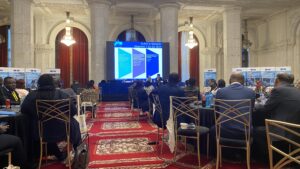
 Projects
Projects
 Project event: CyberEast to CyberEast+. This event serves as the closing conference of the CyberEast project and pave the way to the follow up project CyberEast+. It will follow the project themes of legislation and policies, capacity building, and co-operation; it will tell the CyberEast story from the perspectives of the national partners demonstrating the impact and relevance of the project to improve their capacities regarding cybercrime and electronic evidence. The European Commission and the Council of Europe will formally assess and complete the project and launch a new regional action on cybercrime and electronic evidence in the region through the new CyberEast+ project. The workshop will also discuss in view of adoption a new Declaration on Strategic Priorities for the Eastern Partnership region with key project partners, serving as inspiration for policies and capacity building in the region’s countries.
Project event: CyberEast to CyberEast+. This event serves as the closing conference of the CyberEast project and pave the way to the follow up project CyberEast+. It will follow the project themes of legislation and policies, capacity building, and co-operation; it will tell the CyberEast story from the perspectives of the national partners demonstrating the impact and relevance of the project to improve their capacities regarding cybercrime and electronic evidence. The European Commission and the Council of Europe will formally assess and complete the project and launch a new regional action on cybercrime and electronic evidence in the region through the new CyberEast+ project. The workshop will also discuss in view of adoption a new Declaration on Strategic Priorities for the Eastern Partnership region with key project partners, serving as inspiration for policies and capacity building in the region’s countries.
 Project event: iPROCEEDS-2 to CyberSEE. This closing conference of the iPROCEEDS-2 project will assess the project’s main objectives, including legislation and strategic approaches, mechanisms for reporting, capacity enhancement in cybercrime, training for the judiciary and fostering collaboration between public and private sectors, as well as international co-operation. The focus will be on national partners presenting what difference the project has made to improve their agencies’ competence in handling cybercrime and electronic evidence. The event will mark the formal evaluation and closing of the project. It will also prepare the ground for new regional action targeting cybercrime and electronic evidence in South-east Europe and Turkey: the new initiative “CyberSEE” will be jointly undertaken by the European Commission and the Council of Europe from 2024 to 2027.
Project event: iPROCEEDS-2 to CyberSEE. This closing conference of the iPROCEEDS-2 project will assess the project’s main objectives, including legislation and strategic approaches, mechanisms for reporting, capacity enhancement in cybercrime, training for the judiciary and fostering collaboration between public and private sectors, as well as international co-operation. The focus will be on national partners presenting what difference the project has made to improve their agencies’ competence in handling cybercrime and electronic evidence. The event will mark the formal evaluation and closing of the project. It will also prepare the ground for new regional action targeting cybercrime and electronic evidence in South-east Europe and Turkey: the new initiative “CyberSEE” will be jointly undertaken by the European Commission and the Council of Europe from 2024 to 2027.
 Project event: GLACY+ to GLACY-e. This session serves as the closing event of the GLACY+ project. It will provide an opportunity to review the impact of the GLACY+ project, and to share lessons learned. Building on the positive results of GLACY+, a continuation, consolidation and expansion is now commencing with the “Global Action on Cybercrime Enhanced” (GLACY-e), a new EU-CoE joint project. GLACY-e will extend the experience of the GLACY+ project by supporting new selected countries in Africa, Asia-Pacific and Latin America. It will reinforce the leading role of the 8 hub countries in the capacity building agenda in their respective regions.
Project event: GLACY+ to GLACY-e. This session serves as the closing event of the GLACY+ project. It will provide an opportunity to review the impact of the GLACY+ project, and to share lessons learned. Building on the positive results of GLACY+, a continuation, consolidation and expansion is now commencing with the “Global Action on Cybercrime Enhanced” (GLACY-e), a new EU-CoE joint project. GLACY-e will extend the experience of the GLACY+ project by supporting new selected countries in Africa, Asia-Pacific and Latin America. It will reinforce the leading role of the 8 hub countries in the capacity building agenda in their respective regions.
 Project event: CyberSouth to CyberSouth+. The objective of the final conference is to jointly review and validate the progresses in the fight against cybercrime in the MENA region during the period 2018 – 2023; assess the impact of the CyberSouth project in five main areas related to the project’s results (legislation, work of police, work of judiciary, international co-operation, national strategies) and evaluate together what worked well (best practices) and what can be improved in the next phase.
Project event: CyberSouth to CyberSouth+. The objective of the final conference is to jointly review and validate the progresses in the fight against cybercrime in the MENA region during the period 2018 – 2023; assess the impact of the CyberSouth project in five main areas related to the project’s results (legislation, work of police, work of judiciary, international co-operation, national strategies) and evaluate together what worked well (best practices) and what can be improved in the next phase.
15, 2022 @ 9:30 Eastern Time.
partnership.
success stories.
We will be happy to provide more information about this event.
– RCC acționează pe mai multe fronturi pentru a promova reziliența cibernetică, pentru a combate criminalitatea informatică și pentru a stimula diplomația cibernetică și apărarea cibernetică.
 10 provocări majore cu care se confruntă securitatea cibernetică pe care RCC isi propune sa le securizeze si expuna catre publicul larg:
10 provocări majore cu care se confruntă securitatea cibernetică pe care RCC isi propune sa le securizeze si expuna catre publicul larg:
– Creșterea criminalității cibernetice: Ultimele estimări arată că costurile globale ale criminalității cibernetice vor crește cu 15% pe an din 2021 până în 2025 și că acestea ar putea ajunge până la valoarea de 10,5 trilioane de dolari pe an. Această cifră este mai mult decât profiturile realizate de întregul comerț ilegal de droguri cumulat.
– Deficitul de personal certificat: Lipsa de personal certificat și calificat pentru a satisface cererea tot mai mare de profesioniști din industrie continuă să crească. Există un decalaj global al forței de muncă în domeniul securității cibernetice de 3,4 milioane specialiști și 70% dintre organizații au posturi neocupate în domeniul IT, conform studiului ISC pentru trimestrul 2 privind Forța de Muncă în domeniul Cibernetic. Multe guverne încearcă să găsească soluții pentru a reduce acest deficit, iar companii importante precum Google, Microsoft sau IBM lansează diverse inițiative care vizează formarea și îmbunătățirea competențelor angajaților sau potențialilor candidați în domeniul securității.
– Incluziune și diversitate: Într-o situație în care deficitul de talente este problematic, o altă provocare cu care se confruntă industria este aceea de a face forța de muncă mai diversă și mai incluzivă. Este necesar să se dezvolte inițiative și politici pentru a atrage o mai mare participare din partea femeilor sau a altor grupurilor slab reprezentate. Aceasta nu este doar o chestiune de valori. Nivelurile mai ridicate de incluziune și diversitate sunt asociate cu o mai mare inovație, performanță și productivitate, toate fiind cheia pentru creșterea și dezvoltarea oricărei organizații. Astfel, atragerea către domeniul securității cibernetice a unor astfel de grupuri poate contribui nu doar la creșterea performanțelor cât și la reducerea lipsei de profesioniști calificați.
– Lucru de la distanță și în sistem hibrid: Transformarea digitală, accelerată de pandemia de COVID-19, a arătat foarte clar companiilor că trebuie să acorde prioritate securității digitale. În cazul lucrului la distanță și a celui în sistem hibrid, organizațiile din întreaga lume nu se mai pot baza doar pe întărirea protecției perimetrului interior folosind infrastructura tehnologică locală. Dimpotrivă, trebuie să se asigure că angajații care accesează sistemele companiei de la distanță au pregătirea potrivită și dispun de tehnologia adecvată pentru a evita riscurile pe care infractorii cibernetici sunt atât de dornici să le exploateze.
– Extinderea rețelelor de tip dark web: Creșterea uriașă a activității criminale pe dark web în ultimii ani, în special după debutul pandemiei, reprezintă o amenințare majoră și întărește importanța efectuării activităților de informare despre posibilele riscuri din aceste colțuri întunecate ale internetului. Monitorizarea rețelelor underground îi ajută pe apărătorii cibernetici să prevină atacurile, să înțeleagă cum gândesc fraudatorii și grupurile de criminali informatici, ce vulnerabilități sunt vizate, ce date sunt tranzacționate sau ce instrumente malițioase folosesc actorii rău intenționați pentru a accesa sistemele organizațiilor sau pentru a efectua fraude.
– Noi tactici de criminalitate cibernetică: Noile forme de inginerie socială, ultima tendință în rândul metodelor de atac folosite, obligă organizațiile să țină pasul cu scenariile de atac în continuă evoluție și să transmită aceste cunoștințe personalului lor. O varietate de atacuri phishing care a cunoscut o creștere explozivă în ultimul timp este așa-numitul callback phishing, o tactică care combină phishing-ul tradițional bazat pe e-mail cu phishing-ul bazat pe voce (cunoscut și ca vishing). Acest tip de phishing este folosit pentru a obține acces la sistemele informatice ale organizațiilor și pentru a implementa programe malware, cum ar fi cele de tip ransomware, în rețelele acestora.
– Securitate în ecosistemul de criptomonede: Consumatorii, companiile și guvernele găsesc cu toții noi modalități de a fructifica Bitcoin și alte criptomonede – la fel și infractorii cibernetici. Înșelătoriile cu monede virtuale și atacurile cibernetice împotriva diferitelor părți interesate din acest ecosistem au arătat vulnerabilitatea industriei în fața acestor hack-uri. Nu este de mirare că provocările legate de securitatea din lumea criptomonedei sunt din ce în ce mai mari. Platforma PhishTank oferă o imagine de ansamblu asupra interesului general pentru criptomonede, NFT-uri, jocuri de tip play-to-earn și altele asemenea. În cadrul acesteia este ilustrat numărul de site-uri noi de phishing care sunt depistate zilnic și care sunt special concepute pentru a fura datele de contact ale utilizatorilor pentru accesul la portofelele lor virtuale. Schimburile valutare în criptomonede sunt exploatate chiar și în atacurile de tip APT (Advanced Persistent Threat – un atac care se întinde pe o perioadă lungă de timp cu scopul de a localiza, exploata și exfiltra informații sensibile și confidențiale), așa cum demonstrează un furt recent de 625 de milioane de dolari în criptomonede din jocul video Axie Infinity, care a fost atribuit Grupului Lazarus.
– Ransomware: În timp ce grupurile anti-ransomware continuă să exercite presiuni asupra răufăcătorilor, acest tip de atac presupune încă o amenințare majoră care impune organizațiilor să acorde prioritate pregătirii de răspuns la incidente. Aceasta include implementarea de instrumente necesare pentru a contracara atacurile ransomware, organizarea de programe de instruire cuprinzătoare de conștientizare a securității și pregătirea protocoalelor pentru recuperare în cazul în care un astfel de incident are loc. Din 2020 până în 2021, numărul atacurilor ransomware s-a dublat, iar acum că ne îndreptăm spre 2023, acest tip de atac rămâne în continuare o amenințare semnificativă. Într-adevăr, dacă ne uităm la evoluția sa din ultimii cinci ani, este clar că se întrevede o durată de viață lungă a acestuia ca și metodă preferată de infractori pentru atacuri.
– Metaversul: Proiecțiile optimiste despre adoptarea metaversului arată că până în 2026, 25% din populația lumii va petrece cel puțin o oră pe zi în această lume virtuală. Prin urmare, securitatea în metavers este o provocare pentru viitor. Aceste lumi virtuale comune pentru socializare, jocuri și unde vor circula diverse active vor da, fără îndoială, naștere unui număr mare de atacuri și escrocherii. În plus, inovațiile tehnologice nu sunt întotdeauna dezvoltate ținând cont de considerente de securitate și confidențialitate, deoarece timpul de comercializare are prioritate.
– Dezvoltarea educației și proceselor de conștientizare: O preocupare fundamentală pentru industria IT este o mai bună educație și conștientizare a riscurilor existente de securitate cibernetică. Odată cu integrarea pe scară largă a internetului și a tehnologiei în viața de zi cu zi, la nivel global, suprafața de atac a companiilor s-a extins considerabil în ultimele două decenii. Cu toate acestea, schimbarea de acest tip nu a fost însoțită de acțiuni extinse de conștientizare și de prevenție pentru consumatori la o scară suficient de mare. Deseori se consideră de specialiști că angajații sunt cea mai slabă verigă a apărării cibernetice a oricărei organizații, dar personalul este și prima linie de apărare. Importanța promovării unei culturi care să inspire personalul să rămână mereu vigilent este vitală. Cele de mai sus nu reprezintă în niciun caz o listă exhaustivă a provocărilor actuale și viitoare pentru securitatea cibernetică, dar arată că abordarea oricăruia dintre punctele de mai sus va necesita muncă și efort din partea tuturor părților interesate – nu numai din partea industriei securității cibernetice.ESET, unul din liderii globali pe piața de soluții de securitate cibernetică, cu un istoric de peste 30 de ani de experiență și inovație, include în gama sa soluții antivirus și anti-malware, ce se potrivesc nevoilor companiilor și organizațiilor, indiferent de dimensiune. Pachetele sale de soluții anti-malware, oferă nivele complementare de protecție multi-stratificată integrată și au capacitatea de a depista atacurile timpurii, neclasificate încă, inclusiv pe cele de tip ransomware, pentru a se evita daunele financiare și reputație ale organizațiilor.ESET PROTECT Advanced reprezintă o astfel de soluție complexă destinată companiilor, pe care acestea o pot testa oricând gratuit. Prin componenta ESET LiveGuard Advanced oferă un nivel suplimentar de analiză în cloud sandbox a fișierelor și atașamentelor suspecte, o protecție dedicată a datelor în fața accesului neautorizat în caz de furt/pierdere a echipamentelor, prin criptarea completă a hard disk-urilor. Produsul răspunde complex, cu multe nivele de securitate care se sprijină reciproc, provocării de a gestiona și proteja rețelele IT business în fața amenințărilor informatice tot mai dinamice.
 Tipuri de atacuri cibernetice:
Tipuri de atacuri cibernetice:
– Atacurile cibernetice în domeniul energiei
– Atacurile cibernetice în domeniul sănătății
– Atacurile cibernetice în banking
– Atacurile cibernetice în securitatii informationale
– Atacurile cibernetice de tip mediatic propagandistic
 Cateva ponturi pentru zona SAFE:
Cateva ponturi pentru zona SAFE:
– Analiza internă a securității cibernetice. Primul pas ca să îți protejezi compania este să fiți conștienți că sunteți vizați de atacurile cibernetice. Cum spuneam mai sus, niciun business nu este atât de mic încât să nu reprezinte o țintă pentru hackeri. În plus, securitatea cibernetică a businessului vostru nu este doar sarcina echipei IT. Ea depinde de comportamentul fiecărui angajat. Exemplele pe care le-am dat câteva paragrafe mai sus pot părea comice, dar utilizatorii neglijenți sau neinstruiți sunt o sursă serioasă de vulnerabilitate. Discutați cu toată lumea din companie despre atacurile cibernetice, creați și implementați politici și proceduri de protecție și asigurați-vă că ele sunt respectate fără excepție.
– Auditați-vă securitatea ciberneticăViteza cu care evoluează lucrurile în privința amenințărilor de securitate cibernetică face absolut necesar un audit specializat, din care să aflați cum stați cu adevărat și ce aveți de făcut. Testele de securitate analizează, fără să interfereze cu activitatea firmei voastre, riscul de penetrare a infrastructurii informatice, securitatea aplicațiilor pe care le folosiți și pe cea a infrastructurii IT. La final, experții în securitate cibernetică fac recomandări de corectare a eventualelor probleme descoperite.
– Folosiți servicii specializate de securitate ciberneticăDin ce în ce mai multe voci în domeniul nostru spun că securitatea cibernetică trebuie tratată ca parte a strategiei de business și că ea este predominant o chestiune financiară, nu una de IT. Sună ciudat, dar este adevărat: pagubele unui atac cibernetic reușit se măsoară în bani, pot fi enorme și depășesc cu mult valoarea echipamentelor care trebuie înlocuite.
 Proiectul RCC este activ in Linkedin si poate fi acesat prin click pe link-ul urmator: https://www.linkedin.com/company/rccenter/
Proiectul RCC este activ in Linkedin si poate fi acesat prin click pe link-ul urmator: https://www.linkedin.com/company/rccenter/